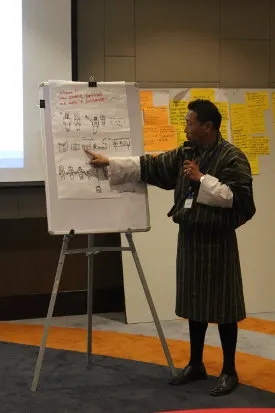
On 6-8 April 2016, International IDEA conducted a three-day training on the State of Democracy assessment framework to a broad variety of government and civil society organizations in Thimpu, Bhutan.
The Royal Research and Advisory Council (RRAC) of Bhutan invited International IDEA to train the participants in assessing the quality of democracy in Bhutan, using the Institute’s State of Democracy (SoD) Assessment Framework.
The RRAC wishes to conduct a SoD assessment to review the current situation, context and characteristics of democracy in Bhutan, find out how democracy has fared since the transition in 2008, and identify challenges and priority areas for reform.
The Raod to democracy in Bhutan
Bhutan’s road to democracy is in many ways considered unique. A small country nestled in the Himalayas, the Kingdom of Bhutan transitioned to democracy in 2006 after the former King, His Majesty Jigme Singye Wangchuck, abdicated his throne to his son Jigme Khesar Namgyel Wangchuck. In 2008, the country enacted its constitution and held its first ever multi-party elections. Although democracy is at a nascent stage in Bhutan - with 2016 marking eight years of constitutional democracy- the RRAC felt there is a need to provide citizens opportunity to assess the quality of democracy, and how it measures up to regional and global practices.
In his opening remarks, the Chairman of the RRAC Lyonpo Sonam Tobgye, Bhutan’s former Chief Justice, stated that, “Important tasks lay ahead to assess the progress made in Bhutanese democracy. As of now, Bhutan is progressing well with its young democracy. However, challenges cannot be denied and ignored. Therefore, it is in our national interest that Bhutan maintains the capacity in place at all times to ensure that our democracy can guarantee a future of a bright democratic Bhutan.”
Dasho Kunzang Wangdi, former Chief Election Commissioner and member of RRAC, presented on democratic systems and practices in Bhutan and iterated that “The democratic process is to our best and long-term interest. Bhutan is fully committed to pursue the goal of vibrant democracy, which is marked with periodic and genuine elections”. He also highlighted that “Bhutan’s democracy is not only real, but meaningful and the key to retaining this dual positivity is conducting the assessment, collectively and collaboratively by all stakeholders through adoption of the SoD assessment framework of International IDEA.”
SoD assessment steps
From the outset, participants were informed that the role of “outsiders” such as International IDEA is limited to supporting and facilitating the transfer of skills and knowledge of the methodology, and sharing of relevant experiences from other countries.
The workshop went through the basic steps involved in conducting a SoD assessment: outlining the importance of conceptualising the purpose and aim of the assessment, planning and preparing the data gathering and analysis, contextualising the assessment questions to Bhutan, holding validation and dialogue forums and setting up the assessments team(s) and the advocacy mechanisms to inform reform agendas. Discussions highlighted that democracy is not an end goal in itself, but a means to achieve the interest and the wellbeing of people of Bhutan - the national goal.
Broad participation
In total, 35 participants (of which 16 were female and 19 were male) took part in the training, bringing a variety of disciplines, skills, knowledge and experiences to the group work and plenary sessions on the SoD assessment and its application in the Bhutanese context. The training was attended by representatives from Bhutan’s main political parties, who constitute the multi-party forum Bhutan Democracy Dialogue; line government agencies such as the Parliament Secretariat, Department of Local Government, Thimphu City Office, National Commission for Women and Children; as well as members from civil society organizations such as Bhutan Network for Empowering Women and the Bhutan Center for Media and Democracy; and the Royal University of Bhutan; research institutions such as Centre for Bhutan Studies, and HMS, a private think tank; and other individual scholars and practitioners.
Designing the road ahead
By the end of the training, there was broad consensus on the usefulness and applicability of assessment of SoD for Bhutan, including the thematic focus areas. Participants better understood what steps the democracy assessment process for Bhutan would entail, and recognized the need for having it institutionalized through periodic assessment as a way of evaluating and reforming policy agenda.
Participants also proposed a draft road map for the SoD assessment for Bhutan; identified their roles as Project Team and/or Steering Committee, and discussed next steps to move forward. The first-ever democracy assessment in Bhutan is furthermore expected to inform an international forum on democracy, organized by the RRAC later this year.
International IDEA has worked in Bhutan since 2013 providing assistance and technical support to the Election Commission of Bhutan (ECB), parliament and other stakeholders, and will continue to assist the Royal Research and Advisory Council in conducting Bhutan’s first-ever State of Democracy assessment.



